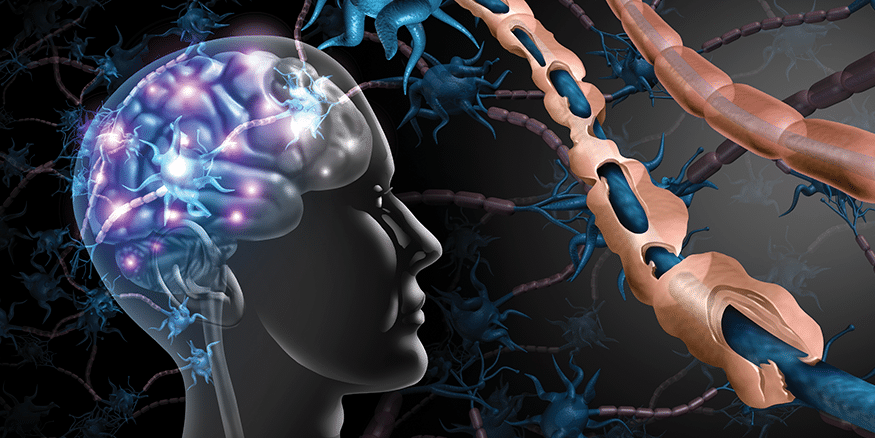
MS and the Gut
Multiple sclerosis (MS) is an autoimmune disease that affects the central nervous system. In those with MS, the immune system attacks the protective covering of the nerves (myelin) in the brain and spinal column (known as the central nervous system, or CNS). Without this protective covering, nerve cells can’t send messages the way they normally do. As a result, many systems in the body are unable to effectively communicate with the brain, and this can cause devastating symptoms. Some of the most common symptoms include fatigue, muscle weakness, clumsiness, difficulty walking, numbness and tingling, mood changes, difficulties with thinking and memory, vision problems, and pain.1 These symptoms can come and go sporadically, and part of the struggle of MS is never knowing what symptoms you will experience on any given day, as it affects so many areas of the body.
Signs of MS usually show up when a person is quite young, with diagnosis typical between 20 and 49 years of age.2 There are more than 90,000 Canadians living with MS and approximately 75% of the cases are in females.1,2 While the cause isn’t known, there are likely both genetic and environmental factors involved, with the environmental effects on the microbiome being particularly important.
Dysregulation in the microbiome, which can be a result of many factors, including diet, where an individual lives, and infections, might affect the disease progression through the brain-gut-microbiome axis.3 The brain and gut are constantly in communication, and changes to the microbiome can therefore influence what goes on in the brain.
While there is no cure for MS, there are several treatments available. Typically, management includes a combination of medications that modulate the immune response to slow MS progression and prevent relapses, along with medications that treat individual symptoms.
GI Symptoms and Conditions in MS
As proper gut function relies on continuous feedback between the CNS and the digestive system, MS can cause many digestive ailments. These can be some of the most difficult symptoms when living with MS, as they are often taboo to talk about and can cause significant embarrassment and anxiety.
Dysphagia
Difficulty swallowing, known as dysphagia, might seem like a minor inconvenience, but it can affect day-to-day life in many ways. Eating, drinking, and taking oral medications can be uncomfortable, awkward, and even unsafe. It can increase an individual’s risk for malnutrition, dehydration, and a lung condition called aspiration pneumonia, which is caused by food or liquid entering the airway instead of the esophagus. Dysphagia affects at least a quarter of those with MS, and is often under-reported.4
Dyspepsia
Upper gastrointestinal pain, nausea, bloating, excessive fullness, the inability to finish meals, heartburn, and chronic burping, are all symptoms of dyspepsia. In some cases, it can also lead to vomiting. Dyspepsia is a functional digestive condition, which means that it is not a result of structural abnormalities, but rather of problems in the way the gut functions. Many individuals with MS also experience these symptoms on a regular basis. According to one study, this could be a result of MS itself or as a side effect of the types of medications used to treat MS.5
Constipation and Fecal Incontinence
The most prevalent chronic digestive symptom in those with MS is constipation, affecting about half of those with MS.6 Individuals who experience constipation have infrequent bowel movements that are difficult to pass, and often accompanied by significant bowel pain and bloating. Constipation is so common because it can result from the interruption in nerve communication in MS, but it can also result from inadequate water or fibre intake due to dysphagia or mobility problems.
Also known as bowel incontinence, fecal incontinence is when an individual is unable to control bowel movements. It can vary in severity from anal leakage to having a complete bowel movement. Fecal incontinence sometimes involves a feeling of urgency, but other times it can come on without warning. Like constipation, it usually occurs due to problems with the communication between the CNS and the gut. Fecal incontinence is rare, affecting only about 2% of the general population, but up to 50% of those with MS experience it at some point, and 25% experience it as an ongoing symptom.6
Many individuals with MS experience both constipation and fecal incontinence, often swinging between these two extremes. These symptoms can be devastating, as it can be difficult to work, have a social life, or even run errands, if you are in pain from constipation or worried about loss of bowel control.
Irritable Bowel Syndrome (IBS)
IBS is a chronic, often debilitating, functional disorder defined by abdominal pain, bloating, and constipation and/or diarrhea. It is already one of the most prevalent gastrointestinal conditions, but in those with MS, it is even more common. One study of 6,312 individuals who had MS found that 28% of them also experienced IBS.7 The study also found that the participants who had IBS had a lower quality of mental and physical health-related quality of life than those without IBS.
Conclusion
Gastrointestinal symptoms are extremely common among individuals with multiple sclerosis. If you have MS and are experiencing any of these symptoms, please speak with your healthcare team so that they can modify your treatment plan to help. Go to badgut.org to learn more about the digestive conditions listed in this article and what steps you can take to manage them, and go to mssociety.ca to learn more about MS.















